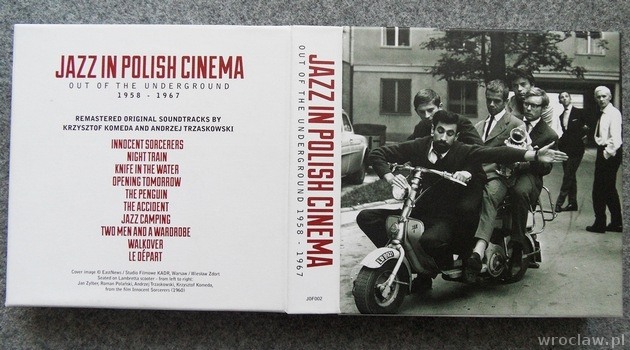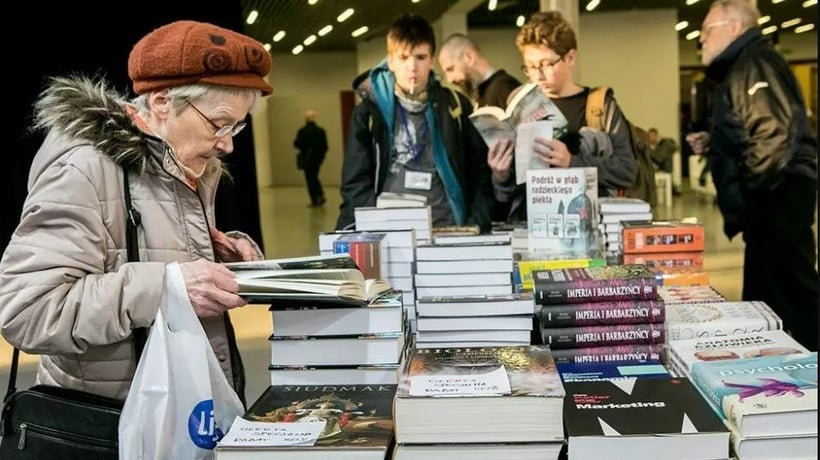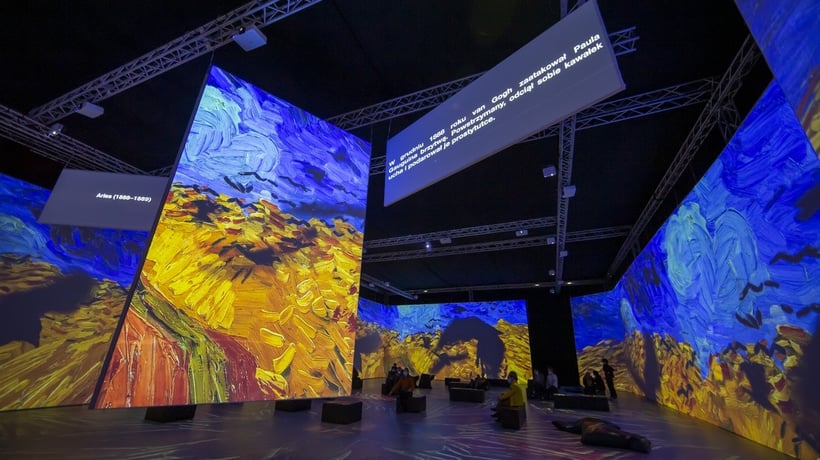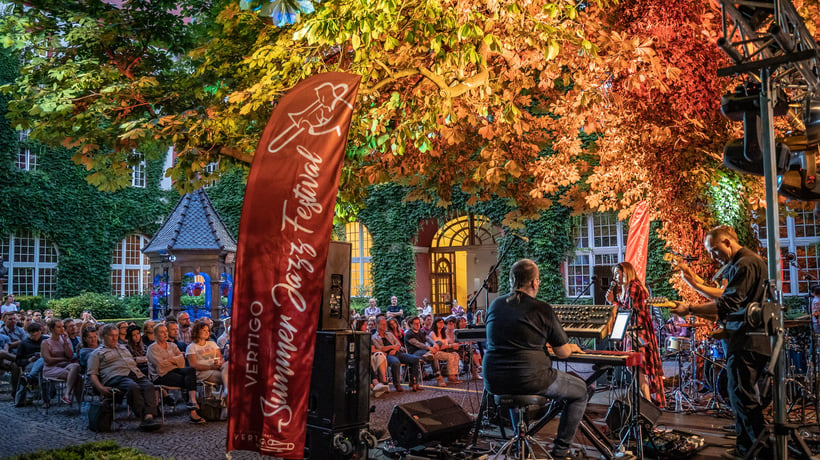Magdalena Talik: How did it come about that a Wroclaw jazz journalist took part in the preparation of a four-CD box "Jazz in Polish Cinema", which is very popular in London at the moment?
Monika Okrój: Let’s begin with the author of the project – its main originator is Selwyn Harris. For 17 years he has written for the English magazine "Jazzwise", where he regularly published essays combining a free analysis of music and characteristics of selected films in a separate column "Jazz on Film". After some time, he hit upon the idea of releasing special sets of music he writes about. Until today, he has released three parts: "Film Noir", "Beat, Square & Cool" and "French New Wave", and "Jazz in Polish Cinema" is the fourth part. I met Selwyn Harris at a jazz festival in Norway two years ago – we may even have exchanged some words on Polish movies, but he asked me to co-operate only after a year, when he had sufficiently explored the potential of Polish film scores.

Monika Okrój with trumpeter Andrzej "Idon" Wojciechowski (left), who played with Krzysztof Komeda, and Paweł Brodowski (right), chief editor of "Jazz Forum"/photo: private archives
Magdalena Talik: Why did Harris become fascinated with Polish movies?
Monika Okrój: This may not be accidental, because Selwyn’s grandmother was of Polish-Ukrainian descent, so he has some affinity for Poland. He also has the investigative nature of a researcher – at first, he saw "Nóż w wodzie" ("A Knife in the Water'") by Polański and then "Dwaj ludzie z szafą" ("Two Men with a Wardrobe"), also by Polański, "Niewinni czarodzieje" ("Innocent Sorcerers") by Wajda and "Pociąg" ("Night Train") by Kawalerowicz followed. These were the films we talked about – sure bets for the release. The key for the creation of a set of records was to find purely jazz music, so, for example, "Bariera" ("Barrier") by Skolimowski was unsuitable for this project, even though the soundtrack was written by Komeda.
Magdalena Talik: How many people prepared this box with Polish music?
Monika Okrój: Only two of us - at the beginning, I put forward ideas and got in touch with people who know more about that subject than me, such as Tomasz Lach – son of Zosia Komedowa, jazz musicians or film experts. In that respect, it was one of the most exciting periods in my life. I watched a lot and was continuously surprised that these Polish movies from the years 1958-1967 are really incredible. Our project was supported by Filmoteka Narodowa, which provided access to English subtitles for Selwyn, and we received much valuable advice from employees of the Łódź Archives and the Documentary and Feature Film Production Company and from the KADR Film Studio, which owns rights to a majority of Polish films from those years. We also received support from the Polish Cultural Institute in London, which expressed its appreciation for initiatives driven by true passion that are aimed not only at making profits.
Magdalena Talik: The edition is British and it is distributed worldwide because you sell this box via amazon.com. How many copies have been released?
Monika Okrój: 1,000 copies, and we already know that this box can be much more popular that previous records released by Selwyn. Why? Many tracks included in "Jazz in Polish Cinema" are true rarities.
Magdalena Talik: What is absolutely unique on these records?
Monika Okrój: Soundtracks for "Pociąg" ("Night Train") by Kawalerowicz, "Kraksa" ("Crash") by Etler and "Jazz camping" by Rybczyński and a part of the soundtrack for "Walkower" ("Walkover") by Skolimowski have never been published. Some themes can enthrall you thoroughly. Especially songs.
Magdalena Talik: I can’t stop humming one song from "Niewinni czarodzieje" ("Innocent Sorcerers") by Wajda: "There was a weather, a fine weather, and a shadow of our heads hung over the pond."
Monika Okrój: Yes, it’s a wonderful song performed by Sława Przybylska, which has never been published before. Another similar example is a song "I wciąż się na coś czeka" ("And you still wait for something"), which is sung by Kalina Jędrusik in the film "Jutro premiera" ("Opening Tomorrow"); it was once released, but in a faster version with orchestral arrangement. And in the original film version published on the record Kalina is accompanied on the piano by Jurandot himself. And there is the climate. I talked to heirs of Jerzy Jurandot – the author of the lyrics, and we put a lot of effort into taking this song out of the archives. There are a few feminine motifs like this on this compilation.
Magdalena Talik: For example, an unforgettable vocalise sung by Wanda Warska in "Pociąg" ("Night Train") by Kawalerowicz.
Monika Okrój: The story of this vocalise was told to me by Wanda herself. I learned that the original idea of Jerzy Kawalerowicz had been to illustrate the running train, so musicians made efforts to reproduce the rattle of rails, whistles etc. They kept playing and trying, but Kawalerowicz was not happy with the results. At dawn they made a break for breakfast, and Warska sat down at the piano and started to hum. The tune that we know from the film had been intended for a performance at Jazz Jamboree. When Kawalerowicz heard it, he simply lost his mind: "Yes, this is it," he shouted. The composer Andrzej Trzaskowski immediately prepared arrangements, but he forgot to ask if this track had been written by anyone at all. They recorded the whole soundtrack with the same motif arranged in different variations. And it turned out that it was "Moonray" – a composition by the famous American jazzman Artie Shaw, who finally learned that his work had been used in a film. Consequently, all copies of records had to be withdrawn and the credits had to be corrected.
A photograph of Tadeusz Łomnicki from the film "Niewinni czarodzieje" ("Innocent Sorcerers") by Andrzej Wajda – a page from the booklet attached to the box
Magdalena Talik: When looking for performers in descriptions on the record, I found the names of young Tomasz Stańko and the actor Tadeusz Łomnicki – the latter played percussion in "Niewinni czarodzieje" ("Innocent Sorcerers"). I always thought that he had just pretended.
Monika Okrój: No, his part in the film is original, because he had learned playing percussion for that purpose for some time. The character of Bazyli is almost a carbon copy of Krzysztof Komeda – both of them are doctors and play music after work. Łomnicki dyed his hair blonde and even borrowed Komeda's clothes in order to get into the role even better.
Let’s come back to jazz musicians. In the instrumental cast you ‘found’ almost everyone. There are Komeda, Trzaskowski, Stańko, Wróblewski, Namysłowski, Urbaniak and others.
Monika Okrój: Sometimes it was a guessing game. Our identification was successful thanks to help from saxophonists Zbigniew Namysłowski and Jan ‘Ptaszyn’ Wróblewski. Many of the musicians mentioned in the booklet are already professionally inactive, but you can still get in touch with them and be lucky to listen to these unusual stories. In those days, little attention was paid to the description of line-ups of bands or the clear identification of copyright. The presence of musicians in a given recording could only be presumed, and the fact that Komeda played with his quintet at that time did not mean that he recorded with them, too. So, for example, it was difficult to identify musicians in "Niewinni czarodzieje" ("Innocent Sorcerers") and "Pociąg" ("Night Train") with Trzaskowski’s music. Musicians participating in sessions were often selected at random. The only known musical band is the one from "Start" by Skolimowski, where, except Komeda, only foreign artists such as Don Cherry perform. However, it is the only film for which original tapes were inaccessible, because – as we heard after long attempts to get in touch with the producer – the archives had been lost.
Magdalena Talik: The sound of the records is fantastic.
Monika Okrój: Selwyn co-operates with the engineer Peter Beckmann, who is incredibly attentive to detail and, when removing ‘dirt’ accumulated over 50 years of storage of recordings, he does his best to retain the original sound and prevent it from being too sterile.
Magdalena Talik: This allows us to feel the atmosphere of those years – a time of coloured birds against the background of the dull reality of communist Poland.
Monika Okrój: This is particularly visible in "Jazz camping" – a film by Bogusław Rybczyński. It is a short documentary with a narrative that brings supplementary information about what's really going on in the frame. The film illustrates one of the two meetings of musicians that took place in the deteriorating centre at the Kalatówki clearing near Zakopane. Musicians sensed freedom and jazz; they partied, played and took advantage of the wintertime. All forms of expression were allowed during the spree. The meeting attracted artistic circles: musicians, actors, film directors. Polański amused the company with his recitation, whereas others danced in pyjamas. Unfortunately, they had to resign from further meetings, because it took much effort to prepare them, and incidentally caused damages put other people off. Sometimes such events were also attended by pro-regime journalists, who subsequently told stories of orgies, drunkenness and brawls.
A scene from "Nóż w wodzie" ("A Knife in the Water") by Roman Polański – a photo published in the booklet attached to the box "Jazz in Polish Cinema"
Magdalena Talik: Magdalena Talik: And how do foreign journalists perceive jazz in Polish cinema?
Monika Okrój: It is perceived mainly thanks to Komeda and Stańko, maybe also Namysłowski to some extent. Until now, opinions of this release have been exceptionally good and surprising. First of all, people are surprised at the liveliness and energetic potential of this music. The score of "Nóż w wodzie" ("A Knife in the Water") has an association with the Miles Davis Quintet – in particular, the "Cherry" theme brings back the atmosphere of its record "Kind of Blue", which shows that we had access to the best achievements of musicians from America. You can hear that we drew inspirations from masters.








